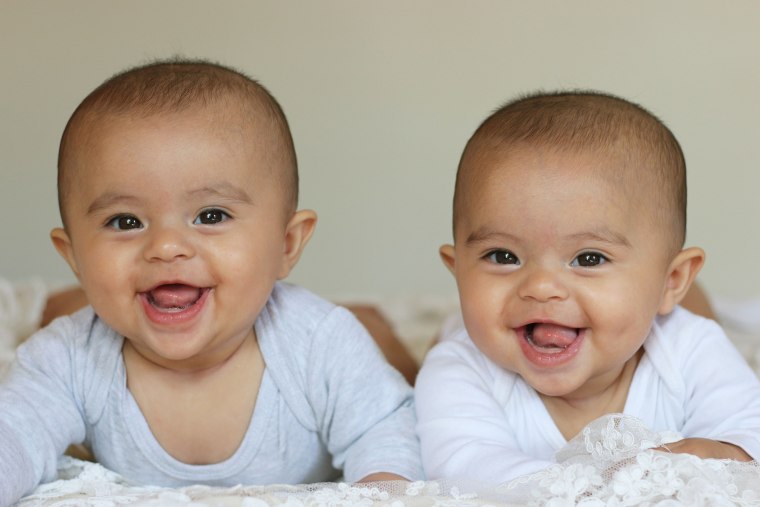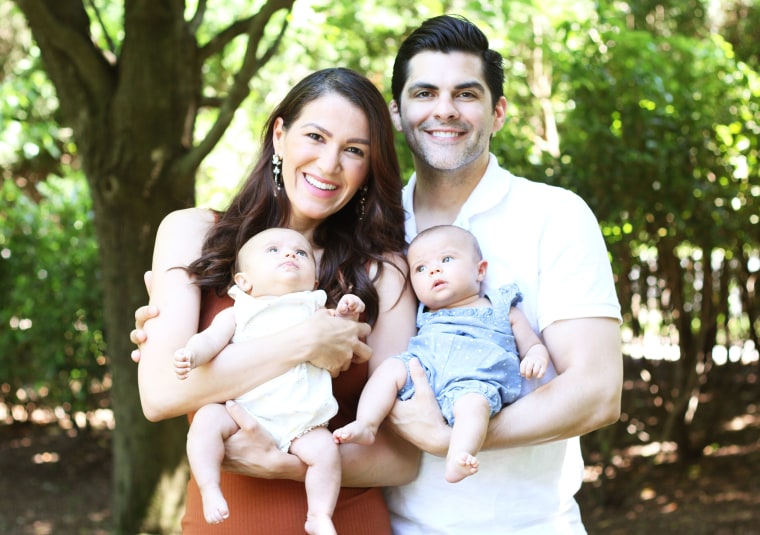You and your partner stare down at that positive pregnancy test. You're in a gorgeously lit bathroom, fresh flowers on the counter (who even does that?), a tear, many tears, laughter — then a hug as you sit huddled on the checkered tile floor.
We always pictured a romanticized version of the First Response commercial when it came to finding out we'd be expecting. I never considered it would instead involve two miscarriages, a team of doctors, needles — very thick needles that became the least of my worries — and paralyzing anxiety. While just about 75,000 babies were conceived in 2016 using assisted reproductive technology, I never thought, at 36, I'd be embarking on a journey to also create one with the help of science.
Our story has a very happy ending: We are mom and dad to identical twin girls. While the ride was bumpy at best, we'd sign up for it again in a microsecond, but here's what I wish I had known before starting an IVF pregnancy.

I'd live in a world of numbers and statistics
With an IVF pregnancy, you’re scrutinizing numbers and statistics daily, even hourly. From understanding why all of our embryos tested abnormally to how many normal embryos are statistically needed to come home with a baby, we were being consistently bombarded with data and percentages.
First, you're scrutinizing your egg retrieval protocol, then weighing the pros and cons of ICSI (where the sperm is injected into the egg in the laboratory) which has been linked with mixed studies regarding an increase in birth defects. Then, once you’ve transferred your embryo, you're anxious whether the progesterone levels are high enough to support the pregnancy. Next, the anatomy scan. Why is the baby's femur in the 20th percentile? It seemed to be a never-ending cycle of Dr. Google.
I'd be more attuned to medical complications
Granted, we were dealt a pretty insane hand when it came to medical complications — which included a bevy of "1% chance issues" like a partial placental abruption at 22 weeks and 27 weeks, a stroke in my eye permanently affecting my vision, cholestasis and more. Also, IVF pregnancies tend to keep partners on edge. For a process that might, to the next couple, feel natural and effortless, those undergoing IVF begin the process of medical stress early on.
We learned both girls had issues with their umbilical cords which left us terror-stricken. Were they getting enough nutrients and oxygen? While doctors reassured us they would be keeping a close eye with monthly scans, it did little to calm our fears and concerns.
For IVF parents even tiny medical hiccups are met with a feeling of impending doom since you're always waiting for that other shoe to drop.
"There are reassurances, but in stages. For instance, I can see the heartbeat, I got through testing, I begin to show a little bit," explained Andrea Mechanick Braverman, Clinical Professor of Obstetrics & Gynecology at Thomas Jefferson University. It's definitely a slower boil to acceptance.
Accept that all procedures have trade-offs
While IVF may be the only option for some couples to create a family, it doesn't come without added trade-offs that I wish I had known more about.
"There are stats and data about complications but the fact is that couples treated for infertility have a higher rate of obstetrical complications even if they don’t have IVF," explained William D. Schlaff, MD. Professor and Chairman, Department of Obstetrics & Gynecology, Sidney Kimmel Medical College, Thomas Jefferson University. The biggest risk factor? Complications due to multiple gestations.
The biggest risk that can be averted relates to how many embryos you transfer, since with prematurity (common in a multiple gestation pregnancy) there is a substantially increased risk of an abnormality, Schlaff adds.
Each couple's protocol is different, with some transferring more than one embryo due to age or other medical factors, but twins came as a huge surprise to us since we transferred only one embryo. Turns out assisted hatching, a technique used by IVF labs to help embryos implant into the womb can increase your chances of identical twins and multiples can carry a six-fold increase risk of complications including pre-term labor, low birth weight, placental abruptions and more.
There are also studies showing that babies conceived through IVF have a 45% higher risk for congenital heart defects, according to findings published in "Ultrasound in Obstetrics and Gynecology." For this reason, a 22-week heart study is often employed for IVF patients.
It's important to accept that medical decisions are based on risk/reward, and this too includes IVF.

How “different” I'd feel from other pregnant women
We walked on eggshells for the entire pregnancy. I mourned the end of our pregnancy after being hospitalized for a partial placental abruption at 22 weeks, where gestationally, delivering the babies would have proven devastating. We never had a baby shower, there were no "bump" photos and I only brought myself to purchase a few onesies days before our scheduled C-section. We were too nervous to celebrate.
Dr. Braverman has seen this behavior routinely with her IVF patients. “When friends and family ask them why they aren’t overwhelmingly happy to be pregnant, the predicament is, 'if I tell everyone that I'm pregnant, then they will expect me to respond with being happy and joyful and I'm not ready to because I'm scared and anxious,'" she explained. Some patients wait until they have no other choice other than to announce, she added.
How much communication is part of the process
We found great comfort in our doctors asking, “what would bring you comfort during this process?” Find a psychologist that specializes in infertility; talk therapy was a big part of my care.
"What you had was people you could talk to, it's an important part of the process,” explains Schlaff. "Clearly there's a lot of medicine and science involved, but what got you through was communication at the end of the day," he added.
Think of yourself as a partner to your medical team, if you'd like to be monitored more often, negotiate it. Don't hesitate to create a world for your family that can ease some stress — your pregnancy will be all the better for it.
That we'd do all over again
Nothing about our IVF pregnancy was easy and the village to raise children came a lot earlier than we expected!
Despite the risks, despite the anxieties and fears, IVF is a choice we'd personally make again and again. This experience has helped us learn so much about ourselves, our relationship to our bodies, minds and each other and how strong we can truly be. And we are lucky enought to echo these lessons of resilience, family and love to our daughters every single day.
